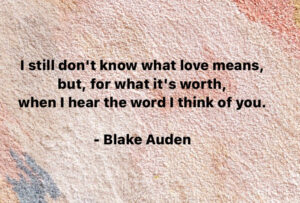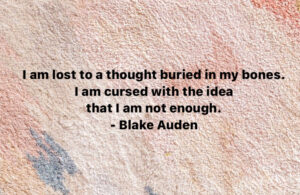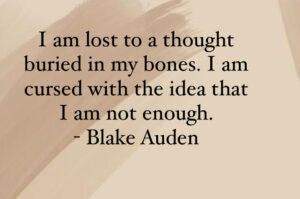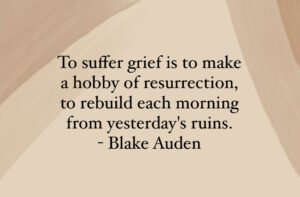Courage is not the absence of fear, but the triumph over it.
– Nelson Mandela
In the realm of adversity, Blake Auden stands as a testament to resilience. Renowned for his poetic prowess, Blake’s journey is a testament to the adage that God reserves the toughest battles for His bravest soldiers. Amidst his own struggles with anxiety, Blake chose a path of profound altruism. Instead of succumbing to his inner turmoil, he courageously shared his experiences, offering solace to others navigating similar challenges.
Blake’s authenticity and unwavering honesty shine through his verses, captivating the hearts of readers worldwide. With three self-published books under his belt, Blake’s dedication to his craft is unmistakable. His latest work, “The Gods We Made,” has garnered widespread acclaim, resonating deeply with audiences.
As a vocal advocate for mental health awareness, Blake fearlessly delves into this crucial topic within his literary endeavors. Our privileged conversation with him offers insights into his remarkable journey and the profound impact of his words on countless lives.
Experience the enlightening dialogue below as we delve into the remarkable world of Blake Auden.
- Blake, can you share with us the inspiration behind your debut book, “Tell the Birds She’s Gone,” and how does it feel to become a bestseller with your first publication?
The book is a culmination of months of reflection on heartbreak, on how it feels to lose someone you weren’t ready to lose. The inspiration really came from experiencing different kinds of loss, and from the desire to try to process the feelings of grief through writing. It wasn’t an easy book to write, and I’m not sure it’s a book I could write today.
I was honestly shocked at how well the book sold. It was only available through my website and a self-published release, and I was packing and shipping all the books myself. It was a crazy period but one I look back on fondly – I’m humbled and grateful that people connected with the poems and wanted to buy my work.
- Your latest book, “The Gods We Made,” delves into themes of love, grief and trauma. How do these topics resonate with you personally?
I’ve always made a point of sharing my struggles with mental health with my followers. It’s important to me that I’m open and honest with readers, and The Gods We Made is the most vulnerable I think I’ve ever been in a book. I’ve struggled for a long time with severe anxiety and depression, and I hope that by openly discussing this – both in poetry and in interviews – I can do something to help other people understand they’re not alone. I’ve grown familiar with grief and trauma, but I don’t think that has to define who you are. There are some tough subjects covered in the book, but the overall message is one of hope.

- In your writing journey, how has your exploration of anxiety and depression through your books helped you cope with your own mental health challenges?
It’s an interesting question. I like to say that on some days,
poetry is the stitches, and on other days it’s the wound.
What I mean by that is that writing with genuine honesty often means confronting difficult emotions and uncomfortable truths. It isn’t always easy to write about the things I spend a lot of my life trying to avoid.
With that said, there is a definite catharsis to writing about these things. Poetry allows us to give form to the things that haunt us, and there’s a certain power in being able to express even the most difficult of emotions. But the best thing about the writing is the way others seem to connect with it. I still get scores of messages from people telling me the work has helped them in some way, and I’m grateful for that every day.
- With titles like “Murmuration”, “The Things we leave behind,” and “Beekeeper” in your bibliography, can you share a bit about the significance of these titles and how they tie into the themes of your works?
I find a lot of inspiration in the natural world, there’s a comfort in reflecting on the way nature is breathing, surviving around us. My titles often pull in small creatures, and I think perhaps that’s because I resonate with their vulnerability.
“The Gods We Made” and “The Things We Leave Behind”, the two books that don’t mention nature in the title, are much more inwardly focused. They’re ultimately books about the way I feel about myself, and the impact I have on those around me.

- Blake, you’ve had numerous interviews with magazines and websites. What has been the most memorable or unexpected question you’ve been asked during an interview, and how did you respond?
I’ve been very lucky in that lots of people want to talk to me, even if I’m never entirely sure why that is. I think a lot of questions still surprise me in some way, particularly in podcasts, where I don’t have the chance to sit and reflect in the same way.
I think my most memorable interviews have been those that focused on mental health. The interview with Forbes sticks in my mind for a number of reasons, as does the podcast I did with Metro. In both cases the interviewers asked questions that got me to think about how my writing, and my mental health, intersect with ideas of masculinity and strength or weakness. It’s a fascinating area of thought, and one that led me to become an ambassador for The New Normal, a fantastic grief charity based in the UK.
Anjum Choudhary: Exploring the Rumi Connection
- As a writer who delves into deep emotional landscapes in your work, how do you approach balancing vulnerability and strength in your storytelling?
It’s an interesting question. I think my focus has always been on honesty, both with the reader and with myself. Being vulnerable means being honest, and I think this leads to a natural strength – or perhaps hope is the better word – in the work. I don’t want to give in to my mental health struggles, and I think that desire to be happy, to be better, naturally finds its way into what I’m writing. Hopefully, this is what’s resonating with people.

- If you could choose one character from any books to spend a day with in real life, who would it be and why?
I would choose Little Dog from On Earth We’re Briefly Gorgeous. Which essentially means I just want to spend the day with Ocean Vuong, he’s a stunning writer and someone that’s had a big impact on my work. I’m fascinated with the way he sees the world, and I can think of few things I’d enjoy more than an afternoon discussing poetry, trauma, and grief with one of the world’s best poets.
- Your writing often touches on the complexities of relationships. How do you navigate portraying love and loss in a way that feels authentic to your readers?
I think this comes back to honesty. Authenticity is, in my opinion, a byproduct of a willingness to write things the way there are, regardless of how that makes you look. I’m not proud of every chapter of my history, and there are situations where I look back and wish I’d behaved differently, spoke differently, thought differently. I don’t try and make myself the victim, or the hero in my work, just a human being.
- Can you share a fun anecdote from your writing process for any of your books, where you had a moment of unexpected inspiration or creativity?
I’ve been reading C A Conrad’s concepts of Soma(tics) recently, and their approach to disrupting our usual patterns of thinking and working. Conrad’s ideas have led me to writing poetry in some rather unusual ways, including writing notes with a waterproof pen whilst sitting in the sea on Brighton beach. I would recommend their work to anyone who wants to shake up their writing process, it’s certainly led to some very different work on my end!

- If you had to choose a soundtrack for one of your books, which songs or musical pieces would you include and why?
I love this question. I would choose On The Nature of Daylight by Max Richter, to be played whilst reading “The Gods We Made”. It’s my favorite piece of music, and something I often listen to when I’m struggling to write. I think the music captures a certain emotion that’s hard to explain, but there’s a definite combination of grief and hope that comes through the composition.
Shefali Dang Unveils: A Poetic Voyage and Creative Insights
- Finally, what advice would you give to aspiring writers who are looking to explore themes of love, loss, and mental health in their own work?
I think I’d say to start from a place of humility. That kind of work requires the writer to be vulnerable with strangers, and that may not always paint you in the best light. But we’re all human beings, and I genuinely think people appreciate an artist being honest – and they can tell when it’s not real.
I’d also advocate for being gentle with yourself. Writing about mental health, grief, and trauma can be difficult and often upsetting. In this case I would suggest taking breaks and ensuring that you’re not putting your mental state at risk. Whilst there is a therapeutic element to writing about our ghosts, there really is no substitute for a mental health professional.
The Gods We Made is out now, and available here: The Gods We Made – Shop Catalog
Ps : Blake’s unwavering commitment to honesty and empathy promises to inspire and uplift us all. Keep an eye out for his upcoming works, as Blake continues to weave tales that resonate deeply with the human experience. We wish him nothing but the best. Feel free to follow him on instagram
And for our dear readers, we bid farewell for now, but rest assured, we’ll be back soon with another captivating tale. Stay tuned for more inspiring stories in the days to come.
